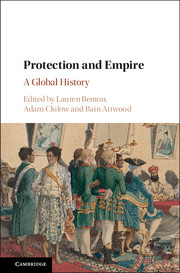66 results
Interpolity Law and Jurisdictional Politics
-
- Journal:
- Law and History Review , First View
- Published online by Cambridge University Press:
- 01 June 2023, pp. 1-13
-
- Article
-
- You have access
- Open access
- HTML
- Export citation
Reshaping The Urban Core: The Politics of Housing in Authoritarian Uruguay
-
- Journal:
- Latin American Research Review / Volume 21 / Issue 2 / 1986
- Published online by Cambridge University Press:
- 12 October 2022, pp. 33-52
-
- Article
-
- You have access
- Export citation
12 - Pirate Passages in Global History: Afterword
-
-
- Book:
- Piracy in World History
- Published by:
- Amsterdam University Press
- Published online:
- 16 December 2021
- Print publication:
- 01 November 2021, pp 267-284
-
- Chapter
- Export citation
5 - Empires and the Rule of Law: Arbitrary Justice and Imperial Legal Ordering
- from Part II - Histories
-
-
- Book:
- The Cambridge Companion to the Rule of Law
- Published online:
- 03 August 2021
- Print publication:
- 12 August 2021, pp 101-118
-
- Chapter
- Export citation
Made in Empire: Finding the History of International Law in Imperial Locations: Introduction
-
- Journal:
- Leiden Journal of International Law / Volume 31 / Issue 3 / September 2018
- Published online by Cambridge University Press:
- 14 June 2018, pp. 473-478
- Print publication:
- September 2018
-
- Article
- Export citation
Introduction: The Long, Strange History of Protection
-
-
- Book:
- Protection and Empire
- Published online:
- 20 October 2017
- Print publication:
- 02 November 2017, pp xiii-xiv
-
- Chapter
- Export citation
Part II - Conquest Reconsidered
-
- Book:
- Protection and Empire
- Published online:
- 20 October 2017
- Print publication:
- 02 November 2017, pp 29-46
-
- Chapter
- Export citation
Part III - Protection and Languages of Political Authority
-
- Book:
- Protection and Empire
- Published online:
- 20 October 2017
- Print publication:
- 02 November 2017, pp 72-90
-
- Chapter
- Export citation
List of Maps
-
- Book:
- Protection and Empire
- Published online:
- 20 October 2017
- Print publication:
- 02 November 2017, pp v-vi
-
- Chapter
- Export citation
Contents
-
- Book:
- Protection and Empire
- Published online:
- 20 October 2017
- Print publication:
- 02 November 2017, pp i-iv
-
- Chapter
- Export citation
Index
-
- Book:
- Protection and Empire
- Published online:
- 20 October 2017
- Print publication:
- 02 November 2017, pp 245-264
-
- Chapter
- Export citation
Acknowledgements
-
- Book:
- Protection and Empire
- Published online:
- 20 October 2017
- Print publication:
- 02 November 2017, pp ix-xii
-
- Chapter
- Export citation
Part V - Protection in an Inter-Imperial World
-
- Book:
- Protection and Empire
- Published online:
- 20 October 2017
- Print publication:
- 02 November 2017, pp 194-210
-
- Chapter
- Export citation
3 - Webs of Protection and Interpolity Zones in the Early Modern World
- from Part II - Conquest Reconsidered
-
-
- Book:
- Protection and Empire
- Published online:
- 20 October 2017
- Print publication:
- 02 November 2017, pp 47-48
-
- Chapter
- Export citation
Part IV - Protection and Colonial Governance
-
- Book:
- Protection and Empire
- Published online:
- 20 October 2017
- Print publication:
- 02 November 2017, pp 132-150
-
- Chapter
- Export citation
Copyright page
-
- Book:
- Protection and Empire
- Published online:
- 20 October 2017
- Print publication:
- 02 November 2017, pp i-iv
-
- Chapter
- Export citation
Notes on Contributors
-
- Book:
- Protection and Empire
- Published online:
- 20 October 2017
- Print publication:
- 02 November 2017, pp vii-viii
-
- Chapter
- Export citation
Part I - Protecting Subjects, Projecting Power
-
- Book:
- Protection and Empire
- Published online:
- 20 October 2017
- Print publication:
- 02 November 2017, pp 1-10
-
- Chapter
- Export citation

Protection and Empire
- A Global History
-
- Published online:
- 20 October 2017
- Print publication:
- 02 November 2017
Empires and protection: making interpolity law in the early modern world*
-
- Journal:
- Journal of Global History / Volume 12 / Issue 1 / March 2017
- Published online by Cambridge University Press:
- 08 February 2017, pp. 74-92
- Print publication:
- March 2017
-
- Article
- Export citation



